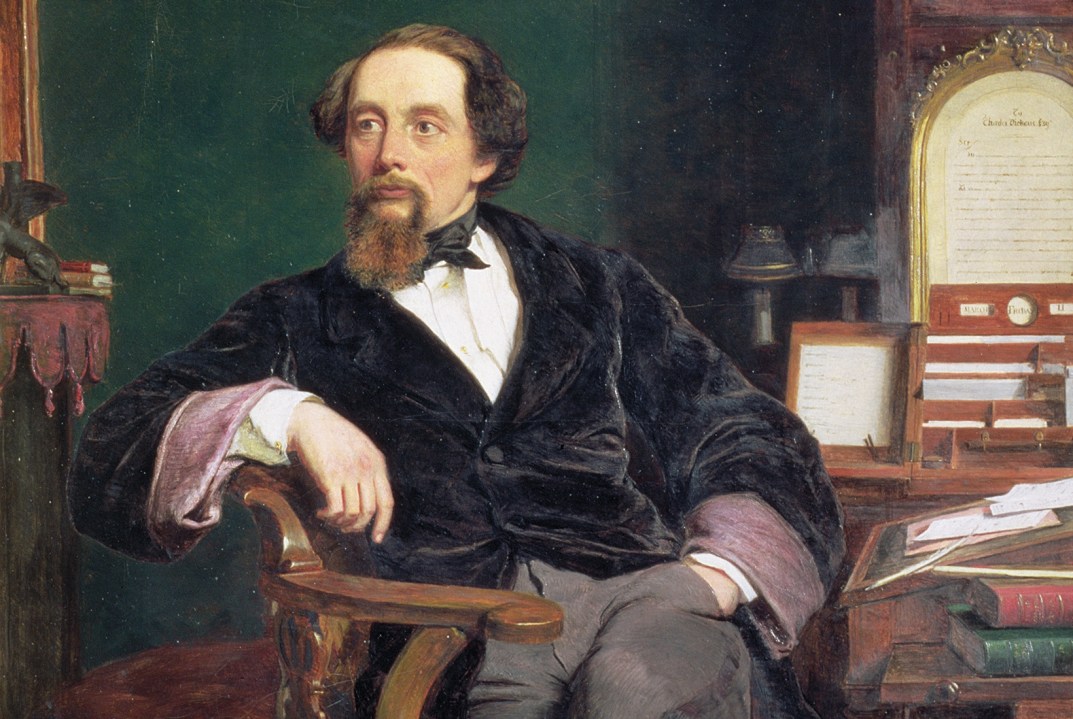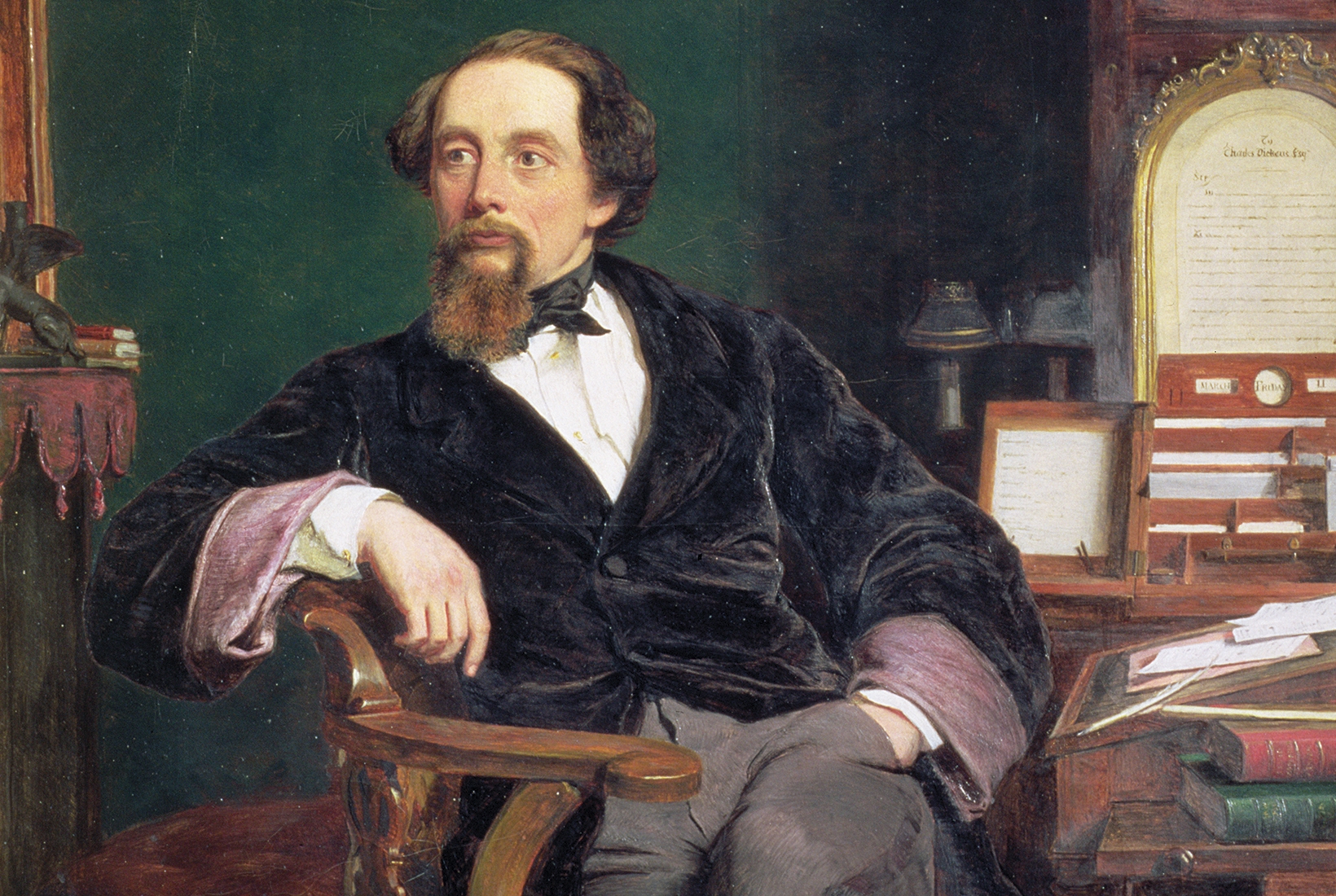Until the age of ten I lived in a street of mock-Georgian houses called Dickens Drive. Copperfield Way and Pickwick Close were just around the corner. Even now I regularly pass the Pickwick Guest House on the main road out of Oxford. None of this is especially surprising. Go online and you can buy a ribbed tank top for your dog emblazoned ‘I love Charles Dickens’ or a flexible Dickens action figure ‘with quill pen and detachable hat’. Visit Rochester or Chatham, the Kent towns where he spent the happiest years of his childhood, and it’s hard to turn a corner without bumping into a Dickensian ghost — Little Dorrit body piercing, or A Taste of Two Cities Indian restaurant.
Whenever new souvenirs come to light they’re treated with all the veneration of a saint’s relics: at a New York auction in 2009 his ivory and gold toothpick fetched more than $9,000. Then there are the costume dramas, the catchphrases (‘Bah! Humbug!’) and the fact that a whiskery drawing of him used to appear on the back of the £10 note, alongside a scene depicting the cricket match in The Pickwick Papers. Dickens is everywhere.
In many ways this busy cultural afterlife is an accurate extension of Dickens’s own life. Novelist, playwright, actor, social campaigner, journalist, editor, philanthropist, amateur conjurer, hypnotist: he was like a bundle of different people who happened to share a single skin. On one occasion an elderly charwoman was told that the man who had been spotted visiting some London lodgings she cleaned was the famous writer Charles Dickens. Although she could not read, every month she attended a snuff shop where she listened to the latest instalment of Dombey and Son being read aloud, and as far as she was concerned the real ‘mystery’ of this novel was how it had been written by just one man. ‘Lawk ma’am! I thought that three or four men must have put together Dombey!’
An even bigger mystery was how this writer had become so popular (a word that still carried a whiff of condescension for Victorian readers) in the first place. Hard work certainly played a large part; in the semi-autobiographical David Copperfield, the hero tells us ‘I made a perfect victim of myself’, and Dickens was equally restless, equally driven. He could be hard in other ways too: Jane Carlyle said that his face looked as if it was ‘made of steel’. However, the most important reason for Dickens’s success was probably the fact that his first readers didn’t only feel like his readers. They felt like his friends. From The Pickwick Papers to The Mystery of Edwin Drood, his novels were a party to which everyone was invited.
Dickens kept returning in his fiction to his unhappy childhood, as if touching a painful bruise
Since his death in 1870 this invitation has been extended even further, although not everyone has been willing to accept it. Next to all his good works — charitable as well as literary — it isn’t difficult to find examples that support his daughter Katie’s view that ‘My father was a wicked man — a very wicked man’. There’s his casual racism and his obsession with women as either simpering angels or boring frumps. There’s also evidence that he sometimes found it hard to tell the difference between fact and fiction: trying to make his parents move to Devon just a few months before he wrote about Nicholas Nickleby and his family settling there, for example, or packing off two of his sons to Australia, like characters in a story he didn’t have time to write.
The anecdote about Dostoevsky meeting Dickens is untrue — it’s too convenient to be told that Dickens put all his good qualities into his good characters and all his bad qualities into his bad characters — but the fact that so many people have believed it suggests that it is true to our sense of his secrets and self-divisions. If we’re drawn to him, maybe that’s partly because of what Dickens himself liked to call ‘the attraction of repulsion’. Why else would anyone still want to read him?
A.N. Wilson’s new book, which shares its title with a one-man show acted by Simon Callow that was filmed in 2000, sets out to answer this question not in a traditional cradle-to-grave biography but by looking through a series of smaller historical keyholes in order to glimpse the larger picture. Some chapters deal with the writing of individual works, for example The Mystery of Edwin Drood, while others expand the focus to consider the private obsessions that Dickens needed to act out, such as the wildly successful public readings that he performed in the later part of his career.
In one, entitled ‘The Mystery of the Charity of Charles Dickens’ (a nod here to Geoffrey Hill’s poem ‘The Mystery of the Charity of Charles Péguy’), Wilson points out that his generosity towards the poor and suffering was also a form of personal therapy, an attempt to deal with the unhappy period in his childhood which he spent working in a blacking factory, and which he kept returning to in his fiction as if touching a painful bruise.
These chapters take off in different directions, but what brings them together is the idea that Dickens was ‘a divided self’.Both a ‘lovelorn romantic’ and a ‘domestic tyrant’, a ‘worshipper of feminine purity’ who ejected his own wife from the family home and probably also contracted venereal disease from a prostitute, he used his fiction to switch between these rival identities like someone dealing out a pack of cards. This isn’t an especially original argument, but what makes Wilson’s version of it so fascinating is the personal and committed way in which he approaches it.
Like G.K. Chesterton, probably Dickens’s greatest critic, Wilson has a fellow novelist’s understanding of what makes a piece of writing work on the page, and the happy knack of bringing it to life in his own prose. ‘The capacity to create fiction was an artistic way of describing the capacity to self-deceive, he concludes in relation to Dickens’s messy inner life; and of Great Expectations he writes simply: ‘Every page hits you like a heart attack.’ Such phrases are the critical equivalent of dum-dum bullets: though compact in themselves, they carry on expanding in the reader’s mind. In fact probably the greatest compliment one could pay this book is to say that it doesn’t only read like something written about Dickens; animated by a restless, rummaging critical intelligence, and a curiosity about many of the things others simply take for granted, at times it reads more like something written by Dickens.
The reason for this is only revealed in the final chapter, in which Wilson recalls in terrifying detail the prep school where he was regularly beaten by a headmaster ‘who was visibly masturbating, usually inside his trousers, but not always inside, as he did it’. Hidden away in ‘what was in effect a concentration camp run by sexual perverts’, for the young Wilson — ‘painfully thin, my bottom and back covered in the bruises and welts inflicted by a sadist teacher’ — the only escape hatches available to him were books. He still vividly remembers one teacher striding around the classroom acting out Wackford Squeers and Fagin, which might have struck some observers as chilling roles to choose in that context; but looking back now, Wilson is convinced that ‘without those lessons, and that introduction to Dickens, my spirit would have gone under’. Here was a writer ‘whose experiences make sense of our experiences’ and ‘whose books hold up a redemptive mirror to our own lives’.
The schoolteacher may have chosen to perform extracts from Nicholas Nickleby and Oliver Twist, but reading Wilson’s heartfelt tribute to the writer who kept his imagination alive it is hard not to think that his own schoolboy self was far closer to the young David Copperfield, who is trapped in an equally miserable childhood when he discovers a shelf of books inside his house. Soon he realises that to open a novel is also to open a doorway into another world, and to be given the freedom to imagine a different future for himself. Perhaps there was more than one sense in which, like Dickens’s hero, when he was reading these stories Wilson was ‘reading as if for life’.






Comments
Comments will appear under your real name unless you enter a display name in your account area. Further information can be found in our terms of use.